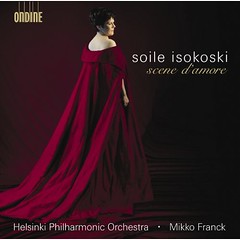
«"Patrician" and "aristocratic" are epithets that critics habitually reach for when describing Finnish soprano Soile Isokoski, a favourite at the Vienna Staatsoper but heard all too rarely in Britain. In her early fifties, Isokoski still preserves the pure, rounded tone, dead-centre intonation and shining top notes that have always been her hallmarks. She is a scrupulous stylist, never forcing her voice, and spinning seamless lines on apparently inexhaustible reserves of breath. Voice-fanciers have long been lamenting that true legato is a dying art. With Isokoski around, it is not dead yet.
For those who have accused Isokoski's singing of being too coolly "instrumental", this recital, encompassing seven of her stage roles, may come as a surprise. Granted, she rather misses Marguerite's breathless delight in the Jewel Song from Gounod's Faust, though there is compensation in the diamantine precision of her scales and perfectly placed high notes.
Inevitably, too, her Tatiana is not quite the fragile ingénue conceived by Tchaikovsky and Pushkin. But her beauty of line and tone - now with a dark, Slavonic glint - and her emotional commitment make the Letter Scene intensely moving.
Elsewhere Isokoski is impassioned and anguished in Micaëla's "rescue" aria from Carmen, while really caring for the curve of the glorious melody. She lightens her tone in a delightful, subtly coloured account of Mimì's aria from La bohème, soaring thrillingly at the climax, and is true and touching in Liù's farewell, with no hint of mawkishness.
Amelia's bittersweet aria from Simon Boccanegra is a model of delicate expression and fine-spun Verdian cantabile, slightly compromised by the orchestra's over-emphatic evocation of the shimmering Mediterranean night. But in the main, Franck accompanies sensitively, nowhere more so than in Desdemona's "Willow Song" and "Ave Maria", where Isokoski's poignant simplicity is shot through with foreboding, even terror.»
Há muitos anos que sigo a notável carreira de Soile Isokoski, a elegantíssima.
Não me canso de recordar As Quatro Últimas Canções, de Richard Strauss, que interpretou em Paris, em 2000, no Théâtre des Champs-Élysées. Que recato, que nobreza, que suavidade e que – faltava a incontornável – elegância!
Em Lisboa, há cerca de dois anos, brindou-nos com uma inesquecível cena final de Capriccio e duas leituras sublimes de árias de Ariadne auf Naxos.
Isokoski nunca conseguiu – ou não quis! – gravar para as majors, com poucas excepções. Tanto melhor! A (igualmente finlandesa) ONDINE é a sua casa discográfica.
Pelas bandas lusas, a ONDINE encontra-se pessimamente representada e distribuída! Em abono da verdade, diga-se que os registos de Isokoski que fui coleccionando foram adquiridos pelo mundo fora.
Na eventualidade de o leitor não encontrar o cd acima identificado, a Itunes já o disponibilizou. Para grandes males, grandes remédios!
Pela minha parte, a escassos dias de partida para a capital da Catalunha, vou juntando cobres para mais uma aquisição discográfica.
3 comentários:
A sua passagem pela Gulbenkian, há cerca de dois anos, quase passou despercebida.
Tive oportunidade de assistir ao recital e gostei muito.
Mas desde então, não mais tinha ouvido falr de qualquer lançamento discográfico.
Fico atento.
A capa é lindíssima. Se o conteúdo for tão bom como o exterior ...
O Fernando Vasconcelos tem razão. É uma capa muito atraente e adequada à cantora e reportório em causa.
J. Ildefonso.
Enviar um comentário